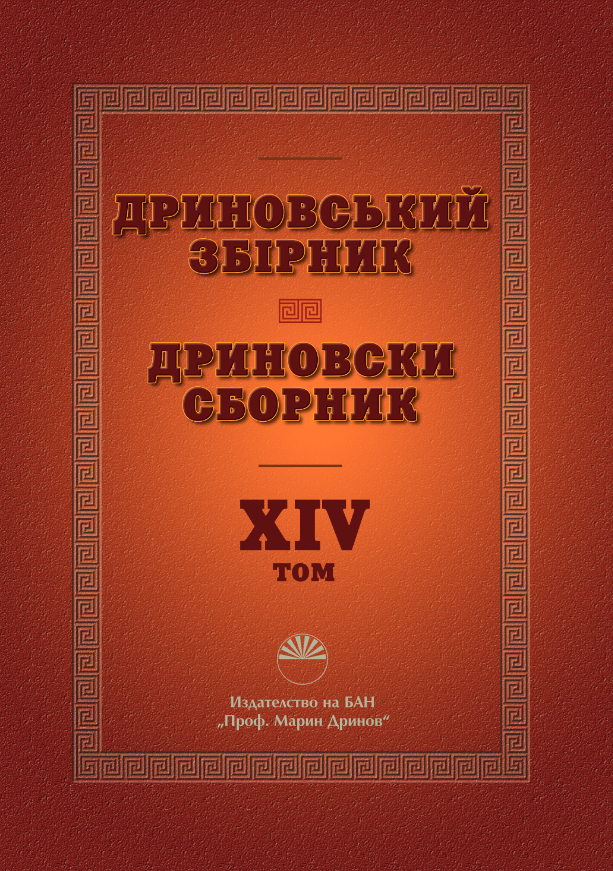The Albanian Factor in Post-Tito Yugoslavia on the Eve of the Breakup of the Yugoslav Federation in the 1990s
Abstract
The article deals with the intensification of the struggle between the two nationalisms – the Albanian and the Serbian, throughout the 1980s and the incessant unrest in Kosovo which gave the starting basis for the disintegration of the Yugoslav federation in the early 1990s. The negative phenomena and trends in the development of Tito's Yugoslavia in its last decades and especially after the death of the Yugoslav leader Josip Broz Tito brought the country to a serious crisis. The contradictions in the Yugoslav society, the economic and political problems and the inter-ethnic tensions were exacerbated significantly and questioned the unity of the Yugoslav federation, the League of Communists of Yugoslavia (LCY) and the future of the “Yugoslav model of socialism”. In general, the Yugoslav crisis had multi-faceted dimensions. Its causes were mainly internal. Particularly acute was the political crisis. Generator of the inter-ethnic and inter-republican contradictions, but also of the nationalist trends, were issues inherited from history and the decisions on the national question from the period of Tito. A general starting point of the nationalist elements was the claim that the interests of the particular nation were neglected at the expense of the all-Yugoslav interests or those of the other republics. On the other hand, the economic crisis directly affected the strengthening of the social tensions, expressed in strikes and rallies across Yugoslavia. The economic situation of the country in those years was characterized by the federation's increased foreign debt, great inflation, reduction of labor productivity, unemployment, continued rising of prices and falling standard of living. The general crisis in Yugoslavia, which encompassed the different areas of life found expression in the extreme aggravation of the economic, social, political and interethnic relations in Kosovo. The political processes, the exacerbation of the inter-ethnic relations, the developments in Kosovo and especially the introduced emergency measures had a negative effect on the international reputation of Yugoslavia. In the late 1980s the multinational Yugoslav federation faced the problem of its further existence.
Downloads
References
Arhiv Jugoslavije (AJ) [Archive of Yugoslavia], 507, Centralni Komitet Savez Кomunista Јugoslavije (CK SKJ) [Central Committee of the Union of Yugoslav Communists] – ІІІ/304. (In Serbian).
Arhiv Slovenije (AS) 1589 [Archive of Slovenia], Centralni Komitet Zveze komunistov Slovenije (CK ZKS) [Central Committee of the Union of Yugoslav Communists], št. 1230, AE:IV/3701. (In Slovenian).
Belić, D., Đ. Bilbija. 1989. Slovenija i Srbija od Cankarjevog Doma do Jugoalata i Gazimestana [Slovenia and Serbia from Cankarjev House to Jugoalat and Gazimestan]. Beograd: Tera, 258 s. (In Serbian).
Bogetich, D. 2001. Regulisanje ustavno-pravnog statusa Kosova i Metohije u socijalistichkoj Jugoslavije 1946–1990 [Regulating the constitutional and legal status of Kosovo and Metohija in socialist Yugoslavia 1946–1990]. Kosovo i Metohija u velikoalbanskim planovima 1878–2000 [Kosovo and Metohija in the Greater Albania plans]. Belgrade: Institute of Contemporary history, 316 s. (In Serbian).
CDA. Centralen Darzhaven arhiv [Central Government Archive], f. 1-b, op. 101, a.e. 1995. (In Bulgarian).
DAMVnR. Diplomaticheski arhiv na Ministerstvoto na vanshnite raboti) [Diplomatic Archive of Ministry of Foreign Affairs], op. 40, a.e. 4415. (In Bulgarian).
George H.W.Bush Presidential Records, G S OF 68, White House Office of Legislative Affairs, James Renne, Files, Yugoslavia (OA/ID 07244–009).
Gllareva, F. 2004. Diplomacia amerikane në konfliktin e Kosovës 1989–1999 [The American diplomacy in the Kosovo conflict 1989–1999]. Prishtinë: Rlta BS&Artini, 201 f. (In Albanian).
Igich, Zh.1996. Kosovo i Metohija (1981–1991). Uvod u Jugoslovenskoj krizu. Dnevnik (Knjiga I). Prishtina: Jedinstvo, 366 s. (In Serbian).
Kostovicova, D. 1996. Parallel Worlds: Response of Kosovo Albanians to Loss of Autonomy in Serbia, 1989–1996. Cambridge: Wolfson College, University of Cambridge, 109 pp.
Ljepojevic, S. 2006. Kosovo and Metohija. Reality, economy and prejudices. Belgrade: TANJUG, 174 pp.
Maliqi, S. 1998. Kosova: separate worlds, reflections and Analyses 1989–1998. Prishtina: MM, 101 pp.
Mertus, J. A. 1999. Kosovo. How Myths and Truths Started a War. Berekley and Los Angeles: University of California Press, 378 pp.
Nikolich, K. 2006. “Niko ne sme da vas bie”. Slobodan Miloshevich u Kosovu Polyu 24–25. april 1987. Istorija i mit [“No one is allowed to beat you”. Slobodan Milosevic in Kosovo field 24–25. April 1987. History and Myth]. Belgrade: Institute of Contemporary history, 244 s. (In Serbian).
Ortakovski, V.1996. Megjunarodnoto polozhenie na malcinstvata [The international situation of the minorities]. Skopje: Misla, 484 s. (In Macedonian).
Simeonov, K. 2012. Kosovo. Pogled kam badeshteto [Kosovo. Looking to the future], Sofia: Minerva, 640 s. (In Bulgarian).
Slobodan Milošević: Put ka vlasti. Osma sednica CK SKS: Uzroci, tok i posledice Srbija 20 godina kasnije 1987–2007. 2008. [Slobodan Milosevic: The road to power. Eighth session of the Central Committee of the SCS: Causes, course and consequences Serbia 20 years later 1987–2007]. Zbornik radova sa međunarodnog naučnog skupa održanog u Beogradu 21. i 22. septembra 2007 [Proceedings of the international scientific conference held in Belgrade on September 21 and 22, 2007]. Belgrade – Stirling, 303 s. (In Serbian).
Stamova, M. 2016. Albanskijat problem v Jugoslavija sled Tito (1980–1990) [The Albanian problem in Yugoslavia after Tito (1980–1990)], Sofia: Paradigma, 310 s. (In Bulgarian).
Veljanovski, N. 2002. Makedonija 1945–1991. Drzhavnost i nezavisnost [Macedonia 1945–1991. Statehood and Independence], Skopje: Institute of National history, Matica Makedonska, 406 s. (In Macedonian).
Vučetić, R., Mimica, A. 2001. Vreme kada je narod govorio: rubrika “Odjeci i reagovanja” u listu Politika: (juli 1988–mart 1991) [The time when the people spoke: column "Echoes and reactions" in the newspaper Politika: (July 1988–March 1991)]. Belgrade: Fond za humanitarno pravo [Humanitarian Law Center], 75 s. (In Serbian).

